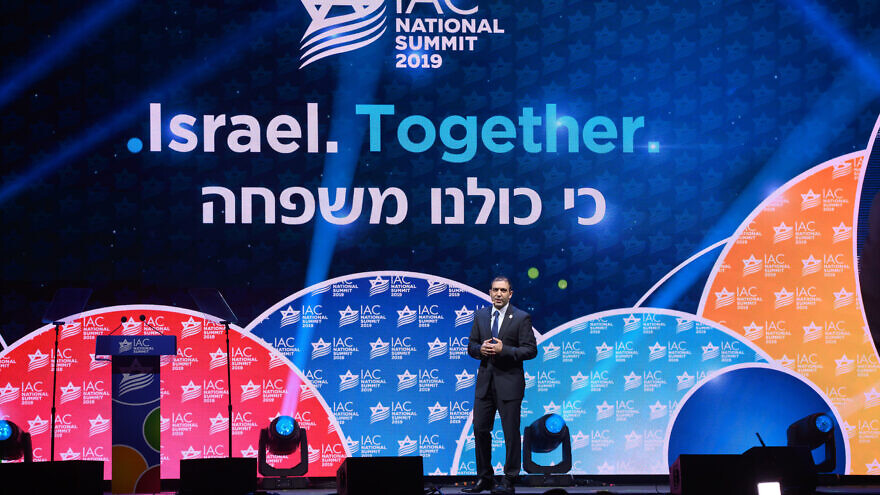More than 4,000 Israelis living in the United States attended the sixth annual Israeli-American Council National Summit over the weekend at the Diplomat Resort in Hollywood, Fla. In his address to the group near the conclusion of the four-day conference, which ran from Dec. 5-8, U.S. President Donald Trump called the IAC the “fastest-growing Jewish organization in America.”
For decades, Israeli immigrants to the United States have by and large sat on the sidelines of the Jewish communal structure in America.
Similar to other more recent ethnic immigrant Jewish groups in the United States, including Russians, Syrians and other Sephardic groups, Israelis have not penetrated the upper echelons of American Jewish organizations. Some traditional-religious Israelis have not yet even been fully embraced and integrated in American synagogues. Yet unlike other immigrant groups, Israelis had not organized themselves as a specific ethnic community with its own synagogues or organizations.
The Israeli American Council is the first to successfully recognize and organize Israelis living in America as an entity. The organization has been led by some of the Israeli American community’s most driven philanthropists and professionals, including new Chairman Naty Saidoff, Former Chairmen Adam Milstein and Shaun Evenhaim, CEO Shoham Nicolet and a handful of other important founders. Backing for the IAC comes primarily from Sheldon and Miriam Adelson, the latter an Israeli living in America.
As first- and second-generation Israelis living in America often have close family members still living in the Jewish state, they have a deep connection and unbreakable love for Israel that is not contingent upon Israeli government policy. Many are traditional if not fully religious. Many have served in the Israeli military and have first-hand knowledge of the sensitive and existential realities of Israel’s vast security challenges, and an intuitive understanding of the nature and behavior of Israel’s enemies.
They also understand many of the challenges facing the Jewish community in America, from unsustainably high intermarriage rates, to the unaffordable costs of Jewish day schools, to anti-Israel bias on university campuses.
Israeli Americans recognize fully that anti-Israel sentiment is anti-Semitism, and they take it personally. And they also intuitively sense when American politicians genuinely and consistently support Israel and when they are inconsistent, simply paying lip service or actually endangering Israel, intentionally or otherwise.
And Israelis aren’t caught up in the need to be overly politically correct. They are not afraid to tell it like they see it, although most have adapted to American cultural norms and politeness.
And while many did not find the wealth they hoped to find in the United States, many others did. A significant number of Israelis living in America are quite successful. Those that showed up for the extended weekend summit at the beach-side Diplomat Resort paid hundreds or even thousands of dollars to attend. And they were highly engaged in the mixed English- and Hebrew-language content, offering cheers and boos when appropriate throughout the many high-level sessions.
The quality of the audience and the content at the summit were a draw for many Jewish communal organization heads, who participated in breakout sessions and plenaries, and networked with potential partners and donors.
As such, Israelis in America are able to offer the greater American Jewish community a great deal, as challenges to Jewish life in America increase and as many Jewish communal and religious leaders are actively and seemingly intentionally promoting a rift between the Diaspora’s largest community and the State of Israel.
Unlike the Anti-Defamation League and other mainstream Jewish organizations, the IAC is willing to call out anti-Semitism on the radical right, the radical left and within radical Islam. The IAC is willing to recognize that anti-Israel rhetoric is a form of anti-Semitism, and one that can be just as dangerous as violent attacks. And they recognize clearly that the Democratic Party is pulling away from its longstanding support for Israel, while appreciating that an unorthodox American president—loathed by many American Jews—has delivered bold support for the Jewish state.
In the past two years, IAC has become politically active as well. IAC for Action, led by Joseph Sabbag, Jake Bennett and others, has promoted anti-BDS measures in cities and states across the country, and is slowly developing into a force that may one day challenge AIPAC for the title of most relevant Jewish political organization in America.
That Trump would honor the IAC with a 45-minute speech immediately raises the political status of Israeli Americans. In his speech, Trump noted that many American Jews “don’t love Israel enough”—a line which was one of the most politically correct comments the president made. Israelis living in America, years after leaving their homeland, now can’t love Israel enough. They love Israel and America, and represent an important bridge between two Jewish communities separated by 6,000 miles, an ocean, and even wider cultural and political divides.
And unlike many Jewish organizations, IAC has been able to tap into a nearly limitless source of capital—the Adelsons, who were the stars of the summit—that will enable the organization to set and reach lofty goals for years to come.
It took time, but the Israelis have arrived in America. They have paid their dues. And with the challenges that American Jewry and Israel now face, this suddenly burgeoning group may have emerged at exactly the right time.
Alex Traiman is managing director and Jerusalem Bureau Chief of Jewish News Syndicate.


























